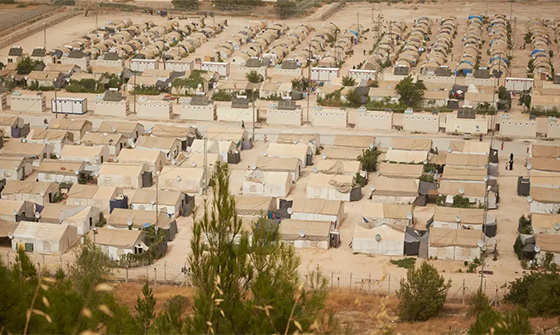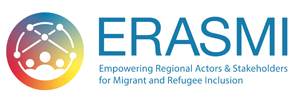Integration through cooperation: A video interview with the Integration Network Erfurt
How do you coordinate a large network of 82 different actors, especially in times of pandemic? What challenges and solutions are there? We asked Rebecca Heintz, coordinator of the Integration Network of the German City of Erfurt, directly in Erfurt (German with English subtitles):
Integration durch Kooperation: Ein Videointerview mit dem Integrationsnetzwerk Erfurt
Wie koordiniert man ein großes Netzwerk mit 82 verschiedenen Akteuren, insbesondere in Zeiten einer Pandemie? Welche Herausforderungen und Lösungsansätze gibt es? Wir haben Rebecca Heintz, Koordinatorin des Netzwerks für Integration der Landeshauptstadt Erfurt, direkt in Erfurt gefragt:
Institutions vs. collaboration
In this prescient 2005 talk, Clay Shirky shows how closed groups and companies will give way to looser networks where small contributors have big roles and fluid cooperation replaces rigid planning.

Building a future from the camps – Turkey’s Nizip refugee camp
Text by: Anne-Marie Bissada
As a Syrian refugee in Turkey, you have a choice of where to stay. Some people arrive with nothing and seek shelter in the camps which are run by the Unites Nations or the Turkish government. But other Syrians start to build a kind of new life in Turkey. Audio is available
A new approach to defending the Human Rights of Migrants
TED Fellow Itamar Mann details the perilous boat migrations of asylum seekers crossing the Mediterranean Sea. With evidence gathered by researchers, he explains how lawyers are making progress in prosecuting human rights abuses
Helping Refugees Integrate
Irem Ergun challenges our current approach to the refugee crisis and highlights the role of locals in enabling and facilitating integration.
What if we helped refugees to help themselves?
The Director of the Refugee Studies Centre at the University of Oxford will shed more light on misconceptions and facts around this issue, challenging you to rethink many aspects of the crisis.
Melanie Nezer is HIAS’ Vice President, Policy & Advocacy. She directs HIAS’ Washington, DC office and leads HIAS’ education and advocacy on immigration, asylum, and refugee protection issues.
Through her own work and life story, Amal is looking at the ‘refugee crisis’. By outlining the differences between migrants, refugees and asylum seekers, she argues that being a refugee is not a choice and hence the world should not be blaming punishing people who are titled as such. In the end, we are all human.
‘I suggest it is time for our generation to start a new era, be just as bold as our counterparts across the pond and coin the European Dream,’ says Mirwais Wakil, originally from Afghanistan now living in Austria and helping refugees to integrate in society.
Around the world, refugees are often seen as being a burden to the communities hosting them. But some economists, like the World Bank’s Apurva Sanghi have studied the real economies of refugee environments, including in Kakuma.
In this talk, Hamse Warfa proposes blockchain-based economic identity for refugees, farmers and the world’s poorest. Hamse Warfa works at the intersection of community building, philanthropy and social entrepreneurship for over the past 20 years.
Emily Arnold-Fernandez founded Asylum Access in 2005 with the conviction that refugees are people with rights, not just needs.
The global refugee crisis is a mental health catastrophe, leaving millions in need of psychological support to overcome the traumas of dislocation and conflict.
Lacey Studnicker has been welcoming refugees for seventeen years, and she says you don’t choose to flee your country, your home, and undertake highly perilous journeys unless you are forced to do so.
Intervista ai ragazzi che hanno beneficiato del progetto Minori Stranieri Non Accompagnati.

